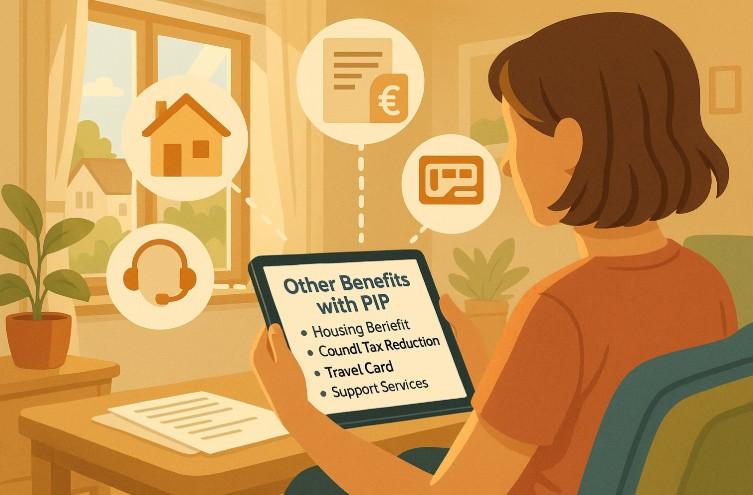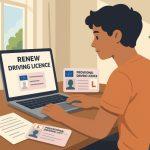If you’re receiving Personal Independence Payment (PIP), you might be eligible for much more than just the monthly payment. Many people in the UK are unaware of the additional financial support and services available alongside their PIP award.
Understanding what other benefits you can claim with PIP could make a significant difference to your daily life. Whether you’re struggling with housing costs, medical expenses, or transport needs, knowing your entitlements can offer greater independence and financial relief.
This blog aims to give you a clear, updated, and easy-to-read guide to all the extra help you could qualify for. We’ll explore options ranging from benefit top-ups to travel concessions, and help you understand how to apply. Every section is backed by official resources to ensure accuracy. Take control of your entitlements and discover what else PIP could unlock for you.
What Is Personal Independence Payment (PIP)?
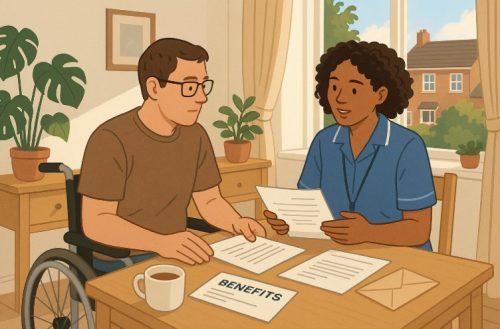
Personal Independence Payment (PIP) is a benefit designed to help people with long-term health conditions or disabilities manage the extra costs of daily life.
It is available across England, Wales, and Northern Ireland, but those in Scotland should apply for Adult Disability Payment (ADP) instead. PIP is made up of two components: daily living and mobility. You may receive one or both, depending on your specific needs.
The daily living component supports individuals who need help with basic tasks like cooking, washing, and managing medications. The mobility component is for those who have difficulty getting around, either physically or due to a mental health condition.
To be eligible:
- You must be aged 16 or over and under State Pension age.
- Your condition must have lasted, or be expected to last, at least 12 months.
- You must have difficulty performing certain everyday tasks or moving around.
You can apply even if you’re employed or have savings. The benefit is non-means-tested, which means it does not depend on your income or assets. It’s assessed based on how your condition affects you, not the diagnosis itself. Having the right medical evidence strengthens your case during the assessment process.
PIP is paid every four weeks directly into your bank account. The amount you receive depends on the level of difficulty you face with daily activities and mobility. Understanding if you qualify is the first step toward unlocking further benefits tied to your PIP entitlement.
What Extra Financial Support Can You Get with PIP?
Receiving PIP may make you eligible for additional financial help known as disability premiums or benefit top-ups. These extras are not automatically granted, so it’s important to know what you can claim and inform the appropriate departments.
You may qualify for extra payments on means-tested benefits such as:
- Housing Benefit
- Income Support
- Jobseeker’s Allowance (income-based)
- Employment and Support Allowance (income-related)
- Pension Credit
These top-ups are often granted when you receive the daily living component of PIP. If you used to get Working Tax Credits and your PIP claim was backdated before 5 April 2025, you may be entitled to a lump sum payment. You must contact HMRC within one month of your PIP decision notice to request this.
Those receiving Universal Credit may also see a higher entitlement if they qualify for limited capability for work-related activity due to their condition.
It is always advisable to provide your PIP award letter to the benefits office managing your existing claims. Knowing which extra help you qualify for ensures you don’t miss out on financial support that is rightfully yours.
What Housing and Council Tax Help Is Available with PIP?
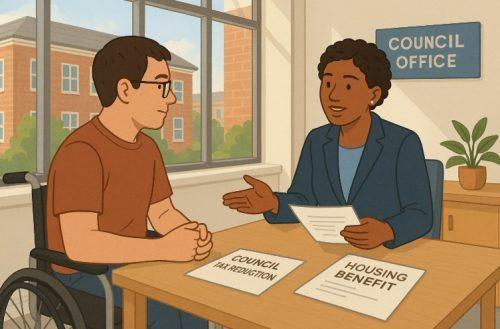
Your PIP award can significantly reduce the financial strain of housing and council tax. If you receive either the daily living or mobility component, you may be eligible for a council tax discount. The exact amount varies by local authority and the rate of PIP you receive.
To apply, you must contact your local council and provide them with a copy of your PIP award letter. Discounts are not automatically applied, so prompt action is essential.
For those receiving Housing Benefit, PIP can increase the amount you get. This applies particularly when the daily living component is included in your award. A higher Housing Benefit can ease the pressure of rising rent costs.
If you have a dependent child receiving PIP who is aged 16 to 20 and still in education or training, your family may also be entitled to increased Housing Benefit or council tax reduction. Always check with both your housing office and local council to confirm eligibility.
These housing-related supports offer meaningful relief for people navigating health challenges. PIP doesn’t just cover personal needs, it also strengthens access to secure, affordable living.
What Travel Discounts and Mobility Help Can You Get with PIP?
If you’re receiving PIP, especially the mobility component, you may be entitled to several transport-related benefits that reduce travel costs and improve accessibility. These include vehicle tax discounts, access to the Motability Scheme, public transport concessions, and disabled parking privileges.
Are You Eligible for a Blue Badge or Vehicle Tax Reduction?
If you receive the standard rate of the mobility component, you can get a 50 percent reduction in vehicle tax. If you’re awarded the enhanced rate, you are entitled to a 100 percent exemption.
You may also qualify for a Blue Badge, which provides parking concessions across England and Wales. These help you park closer to your destination, even in areas where non-disabled drivers may be restricted.
To apply, you must provide evidence of your PIP award, particularly the mobility section. Applications for vehicle tax reduction are made through the DVLA, while Blue Badge applications go through your local council. Both require up-to-date documentation and identification.
Additionally, you could benefit from:
- A Disabled Person’s Railcard for up to one-third off rail fares
- Free local bus travel in England and Wales (check eligibility with your council)
- Access to the Motability Scheme, which allows you to lease a car, scooter, or powered wheelchair using your enhanced mobility rate
Travel concessions help you stay independent, reduce isolation, and manage appointments more easily.
What Other Support Can You Claim Alongside PIP?
PIP can also give you access to various other types of support that aren’t strictly financial but are equally valuable. One key benefit is Carer’s Allowance. If someone helps care for you regularly, they may be eligible for this additional payment. To qualify, the carer must be looking after you for at least 35 hours per week and meet income and eligibility criteria.
You may also be eligible for help with healthcare costs, including:
- Free NHS prescriptions
- Free dental treatment
- Assistance with eye care
- Travel costs to hospital appointments through the Healthcare Travel Costs Scheme
In some cases, people with PIP also qualify for energy bill support through specific disability-related schemes, especially during the winter months.
Always check what’s available in your area and ensure you provide your PIP documentation when applying. These added layers of support make a real difference to everyday life beyond just monthly payments.
How Do You Apply for These Additional Benefits with PIP?
Applying for additional benefits once you’ve been awarded PIP involves proactive communication with the right offices. Most of the time, these extras are not applied automatically, which means you’ll need to take steps to access them.
Start by gathering the following documents:
- Your PIP award letter (also known as a PIP decision notice)
- Your National Insurance number
- Any existing benefit award letters
- Proof of identity if required
Next, contact the office responsible for each benefit or service. For example, your local council handles council tax and Blue Badge applications, while HMRC manages tax-related issues. In most cases, applications can be made online, over the phone, or by post.
Explain that you receive PIP and ask specifically what other help this entitles you to. Keep a record of your communications. If you encounter issues, organisations like Citizens Advice can guide you through the process. Being organised and clear can help unlock everything you’re entitled to.
What Changes Should You Report That May Affect Your PIP and Other Benefits?
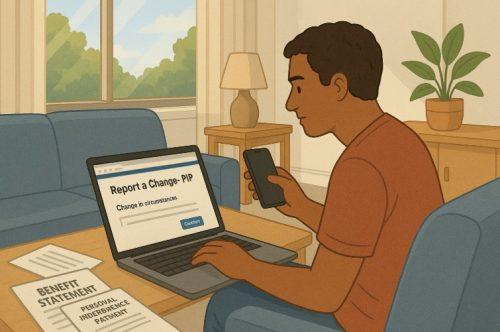
Staying compliant with benefit rules is important to avoid overpayments or disruptions to your entitlements. Certain changes in your circumstances must be reported to the Department for Work and Pensions (DWP) immediately.
How Can You Report a Change in Circumstances to DWP?
You should notify DWP if there are changes in your health condition, support needs, or personal circumstances.
This includes:
- Needing more or less help with daily living or mobility tasks
- Moving into or out of a care home, hospital, or supported living
- Changing address or healthcare provider
- Planning to go abroad for more than 4 weeks
To report, call the PIP enquiry line or write to the DWP using the address provided on your award notice. You may also have someone report on your behalf if you’re unable to do so.
What Happens If You’re Overpaid?
If you fail to report changes on time or give incorrect information, you may be overpaid. Overpayments must be repaid and can lead to legal action in serious cases.
The DWP can recover the money through deductions from future benefits. To avoid this, always be accurate and timely in your updates. Keeping DWP informed helps ensure you receive the right level of support at all times.
What Happens to PIP and Other Benefits If You Move Between UK Nations?
Moving between England, Wales, Scotland, or Northern Ireland while receiving PIP can impact your claim and potentially change the benefits you’re entitled to. It’s essential to understand the different systems across the UK and what steps to take when relocating.
What Should You Do If You Move to Scotland or Northern Ireland?
If you move from England or Wales to Scotland, you don’t need to make a new claim immediately. You will be transferred automatically to the Adult Disability Payment (ADP), which has replaced PIP in Scotland.
However, you must inform the Department for Work and Pensions (DWP) of your move so the transition can begin smoothly. If you’re moving to Northern Ireland, you must still notify the DWP and apply for PIP through the local benefits system. Failing to report your move may result in missed payments or delays in your entitlements.
How Do the Rules Differ for ADP and PIP?
While ADP in Scotland mirrors much of PIP’s structure, there are some differences. ADP applications are designed to be more accessible, with fewer face-to-face assessments and a more person-centred approach. Your eligibility remains largely the same, but you may notice changes in how assessments and reviews are carried out.
If you’re receiving PIP and move into Scotland, your payment continues for 13 weeks before the Scottish system takes over. Be sure to make a new claim for ADP promptly to avoid interruptions. By contrast, moving from Scotland to England or Wales requires applying for PIP within that same period to maintain continuity of support.
Understanding these differences ensures that your benefits don’t lapse during a cross-border move and that you remain properly supported in your new location.
What Other Help Is Available If You’re Nearing the End of Life?
If you’re facing a terminal illness or a life-limiting condition, the government provides quicker and more comprehensive support through the special rules for end-of-life care. In these situations, you can receive PIP at a higher rate and without the usual lengthy assessments.
To qualify under these special rules, a medical professional must confirm that your condition may result in death within the next 12 months. You’ll automatically receive the enhanced daily living component and may also be eligible for the mobility component, depending on your needs.
The application process is streamlined. A medical form (SR1) must be submitted by your doctor or healthcare provider. You can start the claim yourself or have someone else apply on your behalf.
No face-to-face assessment is required, and the claim is usually processed more quickly than a standard application. This ensures that individuals nearing the end of life get the financial support they need without delay or unnecessary stress.
What’s the Best Way to Stay Updated on PIP and Additional Benefit Changes?
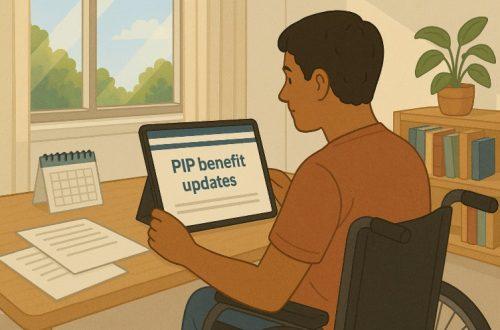
Benefit rules and eligibility criteria often change. Staying informed helps ensure that you don’t miss out on support or fail to meet updated requirements. The best way to stay updated is to regularly check official sources such as the GOV.UK website.
You should also:
- Subscribe to updates from the Department for Work and Pensions (DWP)
- Sign up for email alerts on changes to disability benefits
- Follow trusted organisations like Scope and Disability Rights UK
Additionally, your local council’s website often posts updates on travel concessions, housing support, and council tax changes related to PIP.
Charities like Citizens Advice can also offer real-time advice and updates through their advice lines, websites, or in-person appointments. These services are especially helpful when interpreting complex rule changes or new benefits you might qualify for.
By keeping informed through these channels, you can confidently manage your PIP and ensure you continue receiving everything you’re entitled to.
Conclusion
If you’re claiming PIP, you’re already receiving vital support for managing your daily life. But many people don’t realise how much more they could access. From financial top-ups and council tax discounts to travel support and medical cost relief, your PIP award can open the door to numerous other benefits.
Make sure you check for updates regularly, contact the appropriate departments with your PIP award letter, and seek help when applying for additional support. The key to maximising your entitlements is knowing where to look and taking action promptly.
Take time to review your options and ensure nothing is left unclaimed. The right support can significantly ease your financial and daily burdens, helping you live more comfortably and independently.
FAQs
What benefits increase if I get PIP?
You may receive top-ups on Housing Benefit, Income Support, and ESA if you get the daily living part of PIP.
Can I get free travel if I claim PIP?
Yes, PIP recipients can get free or discounted bus and rail travel, and access to the Blue Badge scheme.
Does getting PIP affect Universal Credit?
Yes, receiving PIP can increase your Universal Credit payments through additional disability elements.
Can someone claim Carer’s Allowance if I get PIP?
Yes, someone caring for you for 35 hours a week or more can claim Carer’s Allowance if you get the daily living component.
Is council tax automatically reduced if I get PIP?
No, you must contact your local council and apply for a reduction with proof of your PIP award.
How do I apply for the Motability Scheme?
If you receive the enhanced mobility component of PIP, you can apply online or by phone through the Motability website.
What happens to my PIP if I move to Scotland?
You’ll be moved to Adult Disability Payment (ADP) and must inform DWP to start the transition within 13 weeks.
Recent Posts


